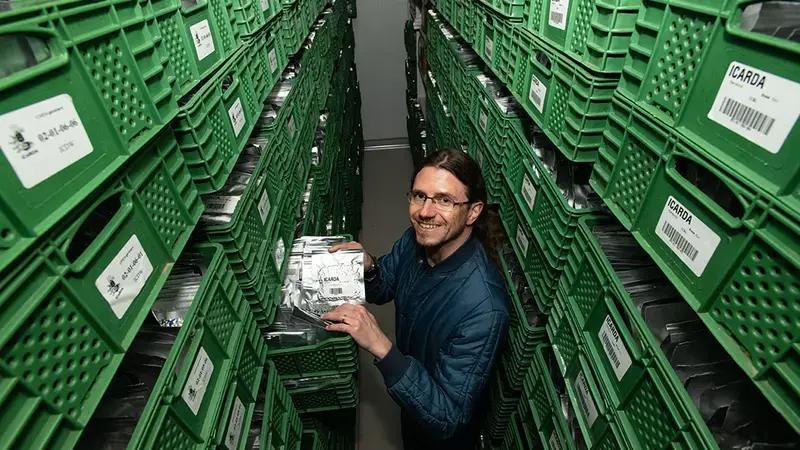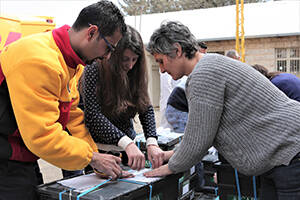ICARDA efforts to preserve its valuable genebank collection pay off

ICARDA established its first genebank at Tel Hadya, Syria in 1984, and by 2012 held an active collection of 141,052 accessions - groups of plant material that contain various and related genes. This unique assembly of common, rare, and endangered plant life embodies one of the world's most extensive holdings of wheat, barley, chickpea, lentil, faba bean, grass pea, and temperate forages species, with extensive diversity represented by a high percentage of landraces and wild relative species. Each accession also possesses precious climate-, disease-, and pest-resistant traits that ICARDA identifies, records, and distributes globally for the research and breeding of improved crops that are now adopted throughout the world.
Many of the plants held by ICARDA are currently endangered in the wild, and their valuable traits could soon be lost were it not for the genebank. However, five years ago, the collection itself was under threat. By 2012 the conflict in Syria had neared Tel Hadya, necessitating the ICARDA genebank's decentralization to new sites in Morocco (Rabat) and Lebanon (Terbol). The transfer of seeds and their safety duplication to Svalbard Global Seed Vault and other partner genebanks such as the Ankara genebank had begun months earlier, and the addition of new 15,759 accessions to the collection through collecting missions was underway in collaboration with multiple partners.
By April 2017, the Syria crisis had escalated, requiring the withdrawal of all remaining ICARDA staff. Since then, the first visits to ICARDA's premises were carried out in March and May of this year by authorities from the Syrian government along with ICARDA staff who together, discovered that the premises had been extensively damaged, with nothing remaining of the collection.
While this was an emotional and moral loss for the organization, the collection itself has lost none of its value. Routine genebank activities mean that 95.6% of the collection has been safety-duplicated in reliable genebanks and at the Svalbard Global Seed Vault.
As another 3.1% of the collection could also be available from the initial donors, this leaves only 1,657 accessions that are currently not safety-duplicated - representing 1.2% of the original collection. Along with the earlier transfer efforts, this means that the overall loss of accessions did not exceed 1,657 out of the original 141,052 and the vast majority of accessions (98.7%), including the most valuable and rare, were safely transported or duplicated elsewhere through ICARDA's of the reconstruction of the collection.
The collection has now bounced back with over 143,806 accessions conserved in the ICARDA genebanks system in Morocco and Lebanon, with support from the CGIAR Genebank Platform, the Global Crop Diversity Trust, GIZ-Germany, European Union, and other development partners. So far, 83,702 accessions, out of the 91,751 multiplied or under multiplication, are now available for distribution. Ongoing efforts to regenerate the remaining accessions will include retrieving 22,810 accessions that were sent to sister CGIAR Centers, such as CIMMYT and ICRISAT, and other national reliable genebanks in Austria, India, Switzerland. ICARDA genebanks are conserving the safety duplicates from Afghanistan, Iraq, Oman, Syria and United Arab Emirates and Yemen.
It is due only to the exceptional efforts of ICARDA staff and the support of our valued partners above that saved the collection. We are eternally grateful for their combined dedication and courage. We are privileged to work alongside them to conserve, protect, and multiply precious agrobiodiversity vital to the future of dryland food systems.

